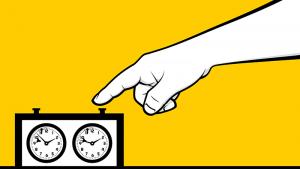
Mastering Your Psychological Intuition
For my victory over Capablanca I am indebted primarily to my superiority in the field of psychology. Capablanca played, relying almost exclusively on his rich intuitive talent. But for the chess struggle nowadays one needs a subtle knowledge of human nature, an understanding of the opponent's psychology. — Alexander Alekhine, upon defeating José Raúl Capablanca for the world championship title in 1927.
Almost a century later, Dr. Alekhine's claim still rings true. To be sure, we base most of our moves on an objective evaluation of the position. But an "I play against the pieces" approach does not work 100 percent of the time. In making your decision, you must factor in certain psychological forces that may yield a sub-optimal move if it is warranted by the circumstances.
In this article, I will examine three such scenarios:
- Taking advantage of your opponent's time pressure
- Exploiting your opponent's tendencies
- Harnessing your momentum
The ability to weigh objective and psychological considerations is a key component of every grandmaster's skillset. So let's dig in!
1. Taking advantage of your opponent's time pressure:
To exploit your opponent's time pressure, you must resist the temptation to mimic his rate of play. An experienced time-trouble junkie will expect forcing moves and superficial traps.

On the other hand, a profound idea that gives him a wide choice of options will frequently throw him into confusion and induce a mistake.
2. Exploiting your opponent's tendencies:
At a high level, preparing for a game entails more than simply choosing an opening; you must also carefully diagnose your opponent's strengths, weaknesses, and tendencies.

In his excellent work Secrets of Chess Training, IM Mark Dvoretsky presents a memorable episode in which an accurate diagnosis essentially decided the game in his favor. Take a look!
3. Harnessing your momentum:
In The Seven Deadly Chess Sins, GM Jonathan Rowson notes that "all chess can be sensibly characterized as a game with positions that are constantly changing." In other words, the evaluation of a specific position rarely tells the whole story.
If you were losing five moves ago and are only slightly worse now, is it not fair to say that (practically speaking) you have the upper hand?
Although 24...g5 was not fully justified from an objective point of view, I could sense that all of the momentum was on my side.

This concludes our journey into the world of intuition. Hopefully, the last four articles succeeded in illuminating an oft-neglected aspect of chess mastery!






